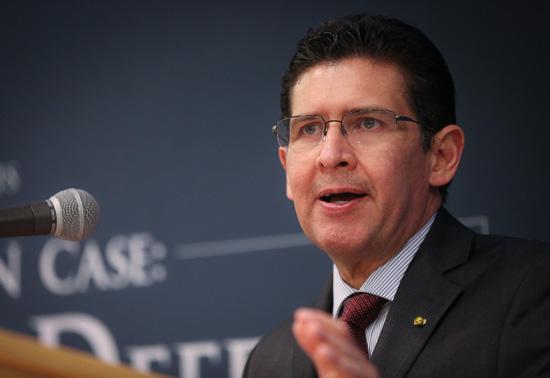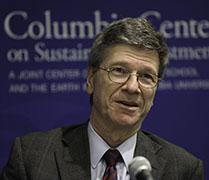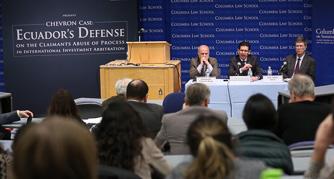Chevron, Ecuador, and the Hazards of Transnational Litigation
The Attorney General of Ecuador, Diego García Carrión, Criticized the Oil Giant's "Aggressive" Use of International Law and Arbitration Proceedings, in a Talk at Columbia Law School
New York, October 19, 2015—Two decades of complex legal wrangling over oil pollution in the Amazon was detailed by Diego García Carrión, the attorney general of Ecuador, in a recent multimedia lecture at Columbia Law School.
| Ecuador Attorney General Diego García Carrión detailed 20 years of legal wrangling by oil giant Chevron in a multimedia lecture at Columbia Law School on Oct. 8. |
Carrión said the Oct. 8 talk marked the publication of his book, Ecuador's Defense, which offered the “state's perspective” on the longstanding litigation that first arose in an environmental lawsuit against Chevron brought by 30,000 Ecuadoreans in the Lago Agrio region, and has since mushroomed into a number of separate cases, parties and courtrooms. Though the state was not a party to the original lawsuit, explained Carrión, the oil giant eventually sought to link the government of Ecuador to the dispute in an ongoing arbitration proceeding permitted under an investment treaty between that nation and the United States.
“By means of this arbitration, the transnational company intends to shift any liability to Ecuador for any amount that it would have to bear in the Lago Agrio litigation,” Carrión said.
The Ecuadorean attorney general's presentation was organized by the Columbia Center on Sustainable Investment, and co-sponsored by the Columbia International Arbitration Association and the Environmental Law Society. Columbia University professor and economist Jeffrey Sachs, director of The Earth Institute at Columbia University, introduced Carrión and called the Chevron litigation “the most complicated legal case I have ever seen.”
The dispute's convoluted history reflects many of the difficult issues raised by transnational litigation, including judgment enforcement across borders; “forum shopping” by deep-pocketed parties seeking more favorable venues; corruption claims against foreign judiciaries; and, in the interconnected world of trade agreements, the new power of international arbitration.
The case began in 1964 when Texaco discovered oil in Ecuador's Amazon basin. Texaco later spent $40 million to clean up pollution from its work there, before transferring operations to the Ecuadorean government and the state-run oil company, Petroecuador. A 1995 agreement among the parties “absolve[d] and forever exempt[ed]” Texaco “from all claims of the Government and Petroecuador” for any pollution left behind. That agreement became central to Chevron's defense, as Chevron merged with Texaco in 2001. But, Carrión countered, Texaco's agreement had anticipated only potential actions by Ecuador and Petrocuador—it didn't preclude third-party claims, allowing the residents of Lago Agrio to file their environmental suit.
| Professor Jeffrey Sachs, left, introduced Carrion and called the Chevron litigation "the most complicated legal case I have ever seen." |
Chevron then pushed for the environmental lawsuit to be moved from the United States to Ecuador. But just before an Ecuadorean judge awarded plaintiffs a $19 billion judgment in 2011 (later reduced to $9.5 billion by Ecuador's Supreme Court), Chevron instituted new legal proceedings in the United States, arguing fraud and racketeering offenses had been committed by the plaintiffs' attorney and an Ecuadorean judge. In addition, in 2009, Chevron submitted its arbitration claim against the government of Ecuador for, among other things, failing to indemnify the company, as it claimed was promised in the old agreement with Texaco.
All of this legal maneuvering represented an attempt to “relitigate” the case, Carrión charged, “to evade the fulfillment of a judicial judgment” and to involve the state in “an international jurisdiction for a civil dispute between private parties.”
A 1997 investment treaty between the U.S. and Ecuador gave investors the ability to resolve disputes with a host government through international arbitration. “At this time, we're awaiting the decision by the tribunal” in Chevron's claims against Ecuador, said Carrión. “In tandem, the Lago Agrio trial, which was brought by the Amazonian communities against Chevron, is pending resolution.” Due to the ongoing conflict over responsibility for the pollution, the contaminated site has yet to be remediated.
Sachs cautioned that similar complex and costly legal maneuverings are likely to result from new international trade agreements containing mechanisms for investor-state dispute settlement (ISDS), like the Trans-Pacific Partnership reached on October 5 by the U.S. and 11 Pacific rim nations.
“It does seem to me that Ecuador is a case in point of what the risks are for this kind of mechanism taking judgments outside of legal systems,” he said. “It obviously opens up a tremendous potential for 25-year lawsuits dragged on in this way through the power of multinational companies.”


